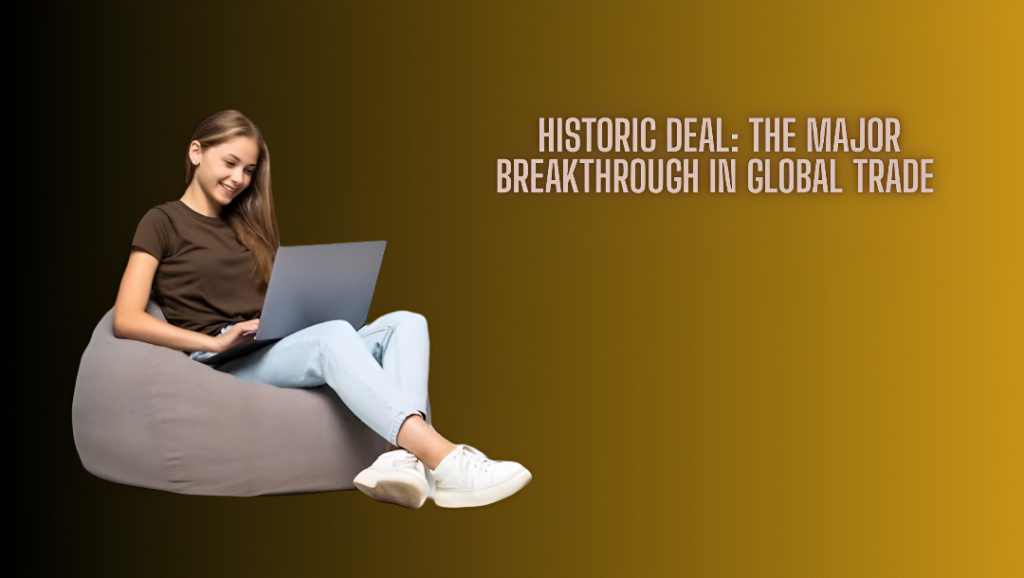In a landmark moment for global economics, world leaders have signed a historic trade deal expected to reshape international markets and redefine cooperation between major economies.
According to News Rest, this breakthrough is not just about tariffs and exports — it marks the beginning of a new digital trade era, where technology, artificial intelligence, and data sharing play a central role in economic growth.
This analysis explores what the deal means for global businesses, how AI chatbots are already influencing trade communication, and why Spotify’s artist-first AI model mirrors the same collaborative vision driving this agreement.
Understanding the Global Trade Breakthrough
What Makes This Deal Historic
This trade pact — signed by over 50 nations — represents the largest cooperative economic framework since the WTO’s foundation. It promises fairer trade terms, digital transparency, and shared access to innovation.
Key Goals of the Agreement
The agreement focuses on reducing trade barriers, protecting data privacy, promoting sustainable development, and strengthening small and medium enterprises (SMEs) through AI-driven logistics.
How This Trade Deal Impacts Global Economies
A Boost for Developing Nations
Countries like Pakistan, Indonesia, and Vietnam are set to benefit from easier export routes and digital trade infrastructure powered by AI.
The Role of Technology in Trade
AI systems and blockchain are now at the heart of supply chain transparency — ensuring secure, traceable, and efficient cross-border transactions.
Spotify Partners with Record Labels to Create ‘Artist-First’ AI Music Products
A Parallel to the Global Trade Model
Just like the new trade deal prioritizes collaboration and fairness, Spotify’s artist-first AI model puts creators first while still leveraging the power of technology.
The Shared Vision
Both systems emphasize balance between innovation and integrity — showing that whether it’s global trade or digital music, progress thrives when people and machines work together.
Insight from News Rest
As News Rest notes, the Spotify initiative and the trade deal share a single lesson: sustainable growth depends on ethical AI use and inclusive participation.
The Role of Artificial Intelligence in Global Trade
AI as the New Trade Enabler
AI tools help governments and companies analyze real-time economic data, forecast supply chain issues, and automate international negotiations.
The AI Chatbot Advantage
AI chatbots play an emerging role in trade communication — simplifying policy documents, translating trade agreements, and facilitating smoother cross-border collaboration.
Which AI Chatbot Is Better for Global Trade Analysis?
ChatGPT – The Negotiator
ChatGPT offers human-like responses and is ideal for drafting agreements, policy communication, and media coverage.
Google Gemini – The Data Strategist
Gemini provides live data analytics and economic forecasting, helping decision-makers interpret market trends instantly.
Claude AI – The Policy Assistant
Claude AI ensures ethical alignment and fact-checked summaries — perfect for official documentation.
Verdict from News Rest
According to News Rest, ChatGPT leads in clarity and usability, while Gemini excels in real-time analysis — both are transforming how global trade is communicated.
Table: Comparing Top AI Chatbots for Global Trade Insights
| AI Chatbot | Best Feature | Ideal Use | Accuracy | Rating |
| ChatGPT | Natural communication | Drafting & negotiation | 4.8/5 | ⭐⭐⭐⭐⭐ |
| Google Gemini | Real-time data & analytics | Economic forecasting | 4.9/5 | ⭐⭐⭐⭐ |
| Claude AI | Ethical content & summaries | Policy writing | 4.7/5 | ⭐⭐⭐⭐ |
| Microsoft Copilot | Workflow integration | Report automation | 4.6/5 | ⭐⭐⭐⭐ |
How the Trade Deal Affects Businesses and Consumers
For Businesses
Startups and exporters can now access international markets with lower taxes and AI-powered compliance tools, reducing time and cost.
For Consumers
Prices may stabilize globally as supply chains improve and transparency increases through digital trade technologies.
Global Cooperation in the Digital Era
Building Trust Across Borders
The trade deal encourages nations to collaborate through digital platforms — a step toward a technology-driven trust network.
Lessons from Spotify’s Collaborative Model
Spotify’s AI partnership shows that innovation succeeds when stakeholders share benefits, a principle mirrored in this trade agreement.
Challenges Ahead
Data Privacy and AI Governance
Countries must agree on how AI data is collected and used, ensuring privacy while enabling economic growth.
Adapting to Automation
Businesses need to upskill workers and adopt digital systems to stay competitive under the new AI-driven trade environment.
FAQs
What makes this trade deal so important?
It’s the largest international agreement in decades, promoting digital transparency, sustainability, and fairer trade policies worldwide.
How will developing nations benefit?
They’ll gain improved access to global markets, technology exchange, and AI-supported infrastructure development.
What role does AI play in the deal?
AI tools help streamline logistics, improve documentation accuracy, and strengthen transparency in trade data.
How does Spotify’s AI partnership relate to this?
Spotify’s “artist-first” AI model reflects the same collaborative spirit — putting human creativity and fairness at the center of innovation.
Which AI chatbot is best for trade insights?
According to News Rest, ChatGPT is best for communication, while Gemini leads in live economic trend analysis.
Conclusion
The historic global trade deal marks the dawn of a new economic era — one where AI, ethics, and collaboration define progress. Nations are learning that prosperity doesn’t come from isolation but from shared innovation.
As News Rest highlights, even Spotify’s artist-first AI initiative mirrors this philosophy: human creativity and machine intelligence can coexist to create fairer, smarter systems.
From boardrooms to trade routes, from AI chatbots to policymaking — the world is entering an age where technology empowers diplomacy.
This isn’t just a trade agreement. It’s a blueprint for a connected, intelligent, and inclusive global economy. 🌍

